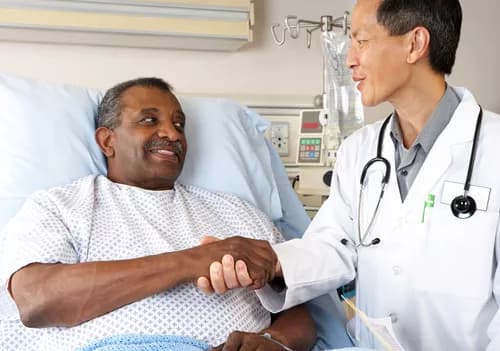
Psychological Intervention Relieves Distress In Patients With Advanced Cancer
CHICAGO – Advanced cancer triggers enormous distress and brings challenges that can seem overwhelming. Yet, most cancer centers lack systematic approaches to help patients and families manage the practical and emotional toll of advanced cancer.
Findings from a randomized clinical trial of 305 patients with advanced cancer suggest that a brief psychological intervention, called Managing Cancer And Living Meaningfully (CALM), could help fill this need. At three months, 52% of patients who received CALM had a clinically important reduction in depressive symptoms, compared to 33% of patients who received usual care. Patients who received CALM also had improved psychological well-being at three and six months and were more prepared for the end of life.
The study will be featured in a press briefing today and presented at the 2017 American Society of Clinical Oncology (ASCO) Annual Meeting.
“This brief talking therapy helps patients facing advanced cancer, and their loved ones, sustain what is meaningful in their life despite its limitations, and face the future,” said lead study author Gary Rodin, MD, Head of the Department of Supportive Care at the Princess Margaret Cancer Centre in Toronto, Canada. Dr. Rodin developed CALM with colleagues Sarah Hales, MD, PhD, and Chris Lo, PhD, and notes that training is underway to help expand the approach to cancer centers worldwide.
“It provides time and space for reflection on the threats and challenges associated with advanced cancer, the experience of a secure base in the therapeutic relationship, and support for the regulation and modulation of emotions,” said Dr. Rodin.
About the Intervention
CALM is a psychological intervention developed specifically for patients with advanced cancer. It consists of three to six 45- to 60-minute sessions delivered over three to six months by trained health care professionals, such as social workers, psychiatrists, psychologists, palliative care doctors and nurses, and oncologists. Family members or partners are invited to attend the CALM sessions. The sessions focus on four broad domains:
- Symptom control, medical decision-making, and relationships with health care providers
- Changes in self-concept and personal relationships
- Spiritual well-being and the sense of meaning and purpose in life
- Future-oriented concerns, hope, and mortality
“CALM is distinct from other interventions in that it is meant to help patients live with advanced disease, rather than just prepare them for the end of life, and in that it is focused on both the practical and the more existential concerns faced by those with advanced cancer,” stated Dr. Rodin.
About the Study
In this study, 305 patients with advanced cancer were recruited at a comprehensive cancer center in a large urban area in Canada. The patients were randomly assigned to CALM therapy plus usual care or to usual care alone (control group).Participants in the control group received routine oncology treatment and follow-up, as well as a clinic-based distress screening. About one-third of patients in the control group received some specialized psychosocial oncology care, but less than 10% received any structured or semi-structured psychotherapy.
Researchers measured depressive symptoms (using the Patient Health Questionnaire-9) and other outcomes at study entry (baseline), and at three (primary endpoint) and six months (trial endpoint).
Key Findings
Compared to patients in the usual care group, patients in the CALM intervention group reported less severe depressive symptoms at three months, and the difference between the two groups was even greater at six months. In terms of clinical impact, for participants with depressive symptoms of at least subthreshold severity (clinically significant and associated with impairment, but which do not meet full criteria for the diagnosis of a major depressive disorder) at study entry, a greater proportion of those receiving CALM than those receiving usual care had a clinically important reduction in severity of symptoms, both at three months (52% CALM vs. 33% usual care) and six months (64% CALM vs. 35% usual care).CALM also helped prevent depression in 137 patients who did not have depressive symptoms at study entry. At three months, only 13% of such patients who received CALM developed depressive symptoms (of at least subthreshold severity) versus 30% of those who received usual care.
At both three and six months, the CALM group reported greater preparation for end of life, greater opportunity to talk about concerns about the future and to be less frightened, and a greater ability to express and manage feelings. At six months these effects were strengthened, and the CALM group also felt more able to understand their cancer experience, deal with changes in relationships as a result of cancer, explore ways of communicating with their health care team and family, and clarify their values and beliefs.
Next Steps
The next steps for this research will include enhancing understanding of the therapeutic process of CALM, the optimal approaches to training clinicians in the intervention, the refinement of measurement tools that best capture the clinical outcomes, and the effectiveness of implementation in diverse clinical settings and geographic regions.This study was funded by the Canadian Institutes of Health Research.
View the full abstract.
Materials provided by American Society of Clinical Oncology. Note: Content may be edited for style and length.
Disclaimer: DoveMed is not responsible for the accuracy of the adapted version of news releases posted to DoveMed by contributing universities and institutions.
Related Articles
Test Your Knowledge
Asked by users
Related Centers
Related Specialties
Related Physicians
Related Procedures
Related Resources
Join DoveHubs
and connect with fellow professionals

0 Comments
Please log in to post a comment.